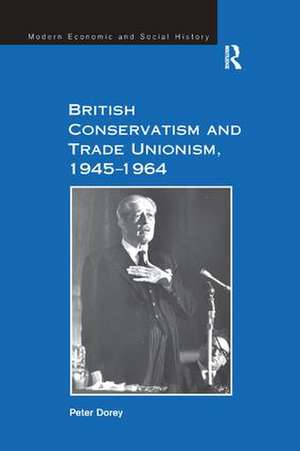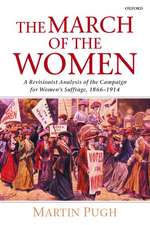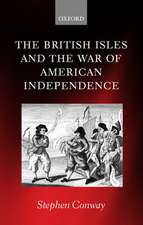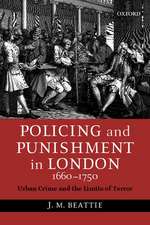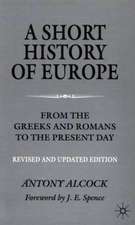British Conservatism and Trade Unionism, 1945–1964
Autor Peter Doreyen Limba Engleză Paperback – 15 noi 2016
| Toate formatele și edițiile | Preț | Express |
|---|---|---|
| Paperback (1) | 469.34 lei 43-57 zile | |
| Taylor & Francis – 15 noi 2016 | 469.34 lei 43-57 zile | |
| Hardback (1) | 1054.71 lei 43-57 zile | |
| Taylor & Francis – 14 mai 2009 | 1054.71 lei 43-57 zile |
Preț: 469.34 lei
Nou
Puncte Express: 704
Preț estimativ în valută:
89.82€ • 93.20$ • 75.07£
89.82€ • 93.20$ • 75.07£
Carte tipărită la comandă
Livrare economică 17-31 martie
Preluare comenzi: 021 569.72.76
Specificații
ISBN-13: 9781138262058
ISBN-10: 1138262056
Pagini: 220
Dimensiuni: 156 x 234 x 13 mm
Greutate: 0.45 kg
Ediția:1
Editura: Taylor & Francis
Colecția Routledge
Locul publicării:Oxford, United Kingdom
ISBN-10: 1138262056
Pagini: 220
Dimensiuni: 156 x 234 x 13 mm
Greutate: 0.45 kg
Ediția:1
Editura: Taylor & Francis
Colecția Routledge
Locul publicării:Oxford, United Kingdom
Notă biografică
Peter Dorey is Reader in British Politics at Cardiff University. This is his ninth book on post-1945 British political history and public policy. Previous books include Wage Politics in Britain: The Rise and Fall of Incomes Policies since 1945 (2001), Policy Making in Britain: An Introduction (2005), The Labour Governments 1964-1970 (Editor, 2006) and The Labour Party and Constitutional Reform: A History of Constitutional Conservatism (2008). He is currently writing two monographs: British Conservatism: The Philosophy and Politics of Inequality, and House of Lords Reform since 1911. These are scheduled for 2010 and 2011 publication respectively. He has also published over 60 journal articles and chapters in edited books.
Recenzii
’This book will certainly be valuable to any scholar seeking detailed knowledge on government-union relations during the period.’ Contemporary British History 'Whether or not Peter Dorey plans further studies on this subject, his account of the immediate postwar period is unlikely to be bettered.' Journal of Contemporary History
Cuprins
Modern Economic and Social History Series General Editor’s Preface; Acknowledgments; Introduction; Chapter 1 Conservatism and Trade Unionism prior to 1945; Chapter 2 Preparing a Voluntarist Approach, 1945–1951; Chapter 3 Voluntarism in Practice, 1951–1960; Chapter 4 In Defence of Free Collective Bargaining, 1951–1960; Chapter 5 Voluntarism under Strain, 1960–1964; Chapter 6 Towards Incomes Policies, 1960–1964; Conclusion;
Descriere
This book examines the a brief period between the end of the Second World War and the election of Harold Wilson's Labour government in 1964, when the Conservative Party adopted a remarkably constructive and conciliatory approach to the trade unions, dubbed 'voluntarism'. During this time the party leadership made strenuous efforts to avoid, as far as was politically possible, confrontation with, or legislation against, the trade unions, even when this incurred the wrath of some Conservative backbenchers and the Party's mass membership. Making extensive use of primary and archival sources it explains why the 1945-64 period was unique in the Conservative Party's relations with the unions, and why, after 1964, things returned to a 'business as usual' confrontational approach.
